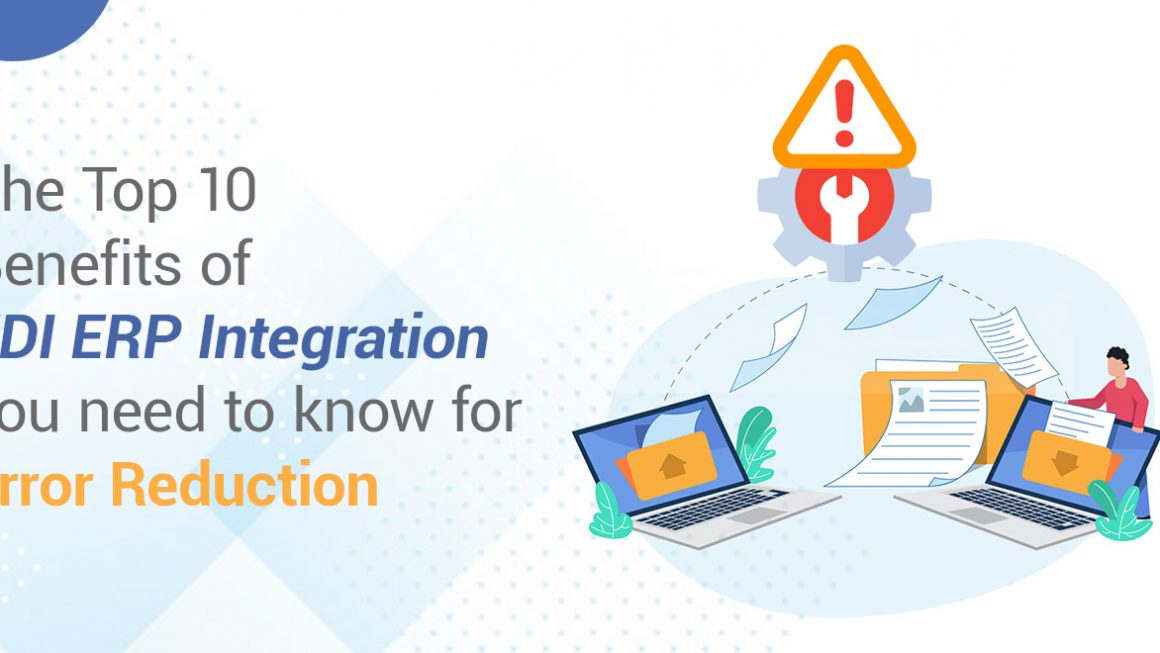Introduction
To stay ahead of the competition in the hectic domain of retail business, you need to use new technologies strategically. Electronic Data Interchange (EDI) has become a game-changer that has completely changed how retail businesses run their businesses. In this digital age, where efficiency and easy contact are significant. Businesses need to use EDI support services to get through the complicated world of modern business. It’s not a choice; it’s a strategic necessity. This blog post will detail how important EDI consultants are and how EDI support services have a big effect on the growth of retail businesses.
These EDI Managed Services have become essential for success in a very competitive market. Because they make it easier to process orders and make sure that rules are followed. Let’s look at the top 10 benefits of EDI support services. Also, they help retail businesses improve customer happiness, streamline their processes with the EDI service providers in the USA, and plan for long-term growth.
What are EDI Support Services?
In the retail industry, the smooth flow of information is very important to the whole supply chain. Electronic Data Interchange (EDI) support services are a sophisticated framework meant to improve and streamline communication between businesses. By making sure that data is exchanged quickly and correctly.
To make it easier for trading partners to send and receive business papers electronically, EDI support services offer a variety of tools and help. These services include more than just setting up EDI systems. They also include ongoing assistance, maintenance, and optimization to make sure that businesses can get the most out of this game-changing technology.
An EDI expert is a key person in setting up and maintaining EDI support services. These professionals know a lot about EDI standards, procedures, and the best ways to use them. An EDI expert helps businesses with all the complicated parts of EDI implementation. And from setting up the system the first time to keeping it running. They do this by making solutions that fit the needs of each business.
Components of EDI Support Services:
Implementation Assistance:
Strategic Integration: EDI support services commence with a strategic integration plan. Consultants collaborate closely with businesses to comprehend existing processes, ensuring the seamless integration of EDI systems into their infrastructure.
Configuration and Customization: Tailoring the EDI solution to specific business needs is pivotal. Consultants configure and customize the system for optimal performance, aligning it with the unique requirements of the organization.
Training and Education:
Technical Proficiency: Acknowledging the technical complexity of EDI, support services include comprehensive training programs. These programs empower staff with the technical proficiency needed to operate, troubleshoot, and leverage the full potential of the EDI system effectively.
24/7 Monitoring and Support:
Real-time Oversight: Ensuring the smooth flow of data is an ongoing process. EDI software companies provide 24/7 real-time oversight, employing advanced monitoring tools to identify and rectify issues promptly, minimizing disruptions to business operations.
Proactive Issue Resolution: Beyond detection, consultants proactively address potential issues, mitigating risks before they impact operations. This proactive approach is fundamental to maintaining the reliability and efficiency of the EDI system.
System Upgrades and Maintenance:
Adaptation to Technological Advancements: Technology evolves rapidly, and EDI standards evolve with it. EDI support services include regular system updates to ensure compatibility with the latest industry standards and technological advancements, safeguarding against obsolescence.
Scheduled Maintenance: Routine maintenance is essential for the longevity of EDI systems. Support services schedule maintenance activities to optimize performance, address emerging issues, and fortify the system’s resilience against potential disruptions.
Security Measures in EDI Support Services:
Data Encryption: EDI consulting services prioritize the security of sensitive business data. Robust encryption protocols are implemented to protect information during transmission, ensuring confidentiality and compliance with data protection regulations.
Access Controls and Authentication: Access to EDI systems is tightly controlled. Support services implement stringent access controls and authentication mechanisms to safeguard against unauthorized access, reducing the risk of data breaches.
Compliance Management:
Adherence to Standards: The EDI support services play a pivotal role in ensuring businesses comply with industry standards and regulations. Consultants stay abreast of evolving compliance requirements, making necessary adjustments to EDI systems to guarantee adherence.
Audit Trail Management: Maintaining a comprehensive audit trail is crucial for compliance. Support services establish and manage audit trails, providing a transparent record of data exchanges for regulatory purposes.
Performance Optimization in EDI Support Services:
Continuous Improvement: The quest for optimal performance is ongoing. EDI service providers in usa focus on continuous improvement, and analyzing system performance. It recommends enhancements to ensure the EDI system operates at peak efficiency.
Scalability Planning: As businesses grow, so do their EDI requirements. Support services include scalability planning, ensuring that the EDI infrastructure can accommodate increased transaction volumes and evolving business needs.
The Top 10 Benefits of EDI Support Services
Streamlined Order Processing:
Modern retail businesses need to make order handling faster and easier. Electronic Data Interchange (EDI) is a key part of making this happen. With EDI, the time-consuming manual tasks that used to be part of order fulfillment are replaced by automated systems. This will speed up the order-handling process. This speedup not only makes it faster to fill orders. Also, makes it much less likely that mistakes will happen when data is entered by hand. The result is a system that is more flexible and quick to respond. It ensures that orders are handled quickly, correctly, and with few operational problems.
Enhanced Inventory Management:
When it comes to retail, managing goods well is very important. EDI makes this part of running a business much easier. One of the best things about EDI is that it lets businesses see their inventory levels in real-time, giving them the most up-to-date information on stock levels. Businesses can change their inventory amounts proactively based on real-time data, which is very important for avoiding stockouts and overstocks. EDI also helps the supply chain work better by making it easier for people at different points to talk to each other. This makes sure that inventory is handled correctly and in line with what customers want.
Cost Savings:
Saving money is an important part of running a business efficiently, and EDI makes it possible to cut routine costs by a large amount. By automating the sharing of data, EDI gets rid of the need for a lot of paperwork and data entry by hand, which naturally lowers the costs of labor. Also, automated processes are more efficient because they make deals faster and more accurate, which means that fewer resources are needed to fix mistakes. The streamlined nature of EDI-supported processes frees up money that can be strategically put toward growth and innovation. This naturally leads to better resource allocation and budget management.
Increased Data Accuracy:
Precision is very important in retail, which is based on data, and EDI is great at providing higher amounts of data accuracy. By automating the processes of entering data, EDI lowers the risks that come with typing data by hand, which often leads to mistakes. Not only are there fewer mistakes when entering data, but the security and reliability of the data also get a big boost. This accuracy affects many parts of running a business, from taking orders to keeping track of supplies, which boosts trust in the decision-making process. With its focus on exact data handling, EDI has become a key tool for companies that want to improve the quality and dependability of their IT systems.
Faster and More Accurate Invoicing:
With EDI, financial activities can change the way things are done by making billing faster and more accurate. Automation is at the heart of this change. Electronic Data Interchange simplifies the billing process, which cuts down on the time that was previously spent doing things by hand. Automated billing processes not only speed up the billing cycle but also help make sure that financial deals are done correctly and on time. As a result, the financial ecosystem is more responsive, and companies can be sure that their billing processes are more accurate. This leads to a stronger and more efficient financial infrastructure.
Improved Communication with Partners:
In the retail business, working together with wholesalers and distributors is key to success, and EDI helps people talk to each other better. EDI makes it easy for business partners to work together by using standard data forms. This standardization makes conversation more efficient by lowering the chance of misunderstandings or mistakes in the data. The result is a network of stakeholders that works better together and is better linked, which makes communication better. EDI makes it easier to share data in a standard way, which not only improves relationships with partners but also makes it easier for them to work together in the future, creating a more unified and efficient business ecosystem.
Compliance and Regulatory Adherence:
EDI is becoming a powerful tool for making sure that businesses follow the rules, even though those rules are always changing. By following industry standards, EDI support services make it easier for businesses to meet strict government rules. This includes following not only business standards but also specific rules set by the government. This lowers the chance of getting fined or punished. Because EDI is committed to compliance, businesses can run their operations with confidence, knowing that the way they share data is in line with the latest laws. This builds trust with both customers and regulatory bodies.
Scalability and Flexibility:
Businesses that can change with the times tend to be the ones that do well, and EDI support services make it easy for businesses to do just that. Scalability is a big plus because it makes it easy for businesses to change their EDI systems to meet new needs. For a business to adapt to changing needs or grow, EDI makes sure that its core technology can grow and change without any problems. The EDI system can grow as needed and is naturally flexible, which lets businesses handle more transactions without any problems and makes sure that it adapts to the changing needs of the retail world.
Enhanced Customer Satisfaction:
Customer happiness is a key part of any successful retail business, and EDI integration plays a big role in this important area of business. When EDI integration software processes are simplified, orders are processed and delivered more quickly, which has a direct effect on the customer experience. Accurate order fulfillment makes customers even happier by preventing mistakes and making sure they get exactly what they bought. Additionally, EDI makes it easier to communicate with partners, which indirectly leads to a better experience for customers. In the end, spending money on EDI is an investment in happy customers, brand loyalty, and a good reputation in a market where competition is high.
Enhanced Analytical Insights:
Among the many benefits of EDI support services, one that stands out is that it can help you get better analytical insights. EDI gives companies a lot of structured data by automating the exchange of data and making formats the same. When used correctly, this data can be a very useful tool for research. Retailers can learn a lot about how their business works, how customers act, and what the market trends are. This ability to analyze data helps people make smart decisions, plan strategically, and get a better sense of the business world. EDI not only makes operations more efficient, but it also helps businesses make better choices based on data, which is a key advantage for long-term growth and competitiveness.
Conclusion
Retail is a field that is always changing, Electronic Data Interchange (EDI) support services keep things running smoothly, accurately, and growing. After going over the top 10 benefits, it’s clear that adding EDI isn’t just an upgrade in technology. It’s also a must for businesses that want to succeed in the complicated world of modern business. Every aspect we looked at shows that EDI is a force for big change. From making order handling faster to making customers happier. It’s not enough to just automate tasks; we need to build an environment where businesses can respond quickly and connect.
When we look back at the journey from faster order delivery to cost savings to making sure compliance and more, the overall effect is nothing short of revolutionary. EDI doesn’t just meet the needs of today. It also gets businesses ready for the problems that will come up tomorrow. EDI support services are not only helpful. But they are also necessary in today’s competitive retail world, where every bit of efficiency counts and customer happiness is king. Through the strategic use of EDI, the case studies and success stories show how real businesses have reached new levels of efficiency and profitability.
So, it’s clear to retail businesses, to invest in EDI for long-term growth, managerial excellence, and a focus on the customer. The top 10 perks we’ve talked about aren’t just boxes to be checked. They’re the building blocks of a strong and successful future for retail. As we accept EDI’s transformative power, we usher in a time when businesses don’t just keep up with change, they lead it. This is because EDI support services bring new ideas and efficiencies to the surface.
FAQs
1. What exactly is Electronic Data Interchange (EDI), and how does it differ from traditional data exchange methods in the retail industry?
Electronic Data Interchange (EDI) is a standardized electronic communication method that facilitates the exchange of business documents between trading partners. Unlike traditional methods relying on paper-based processes, EDI streamlines data exchange through automated, computer-to-computer communication. This results in faster and more accurate transaction processing, reducing reliance on manual efforts and paperwork.
2. How can EDI support services benefit small and medium-sized retail businesses and is the implementation process complex?
EDI support services are particularly advantageous for small and medium-sized retail businesses. These services provide streamlined order processing, enhanced inventory management, and cost savings through automation. While the implementation process may seem intricate. EDI consultants specialize in tailoring solutions to the specific needs of businesses. This ensures a smooth transition and minimal disruption to existing operations.
3. In terms of compliance and regulatory adherence, how does EDI support businesses operating in industries with stringent regulations?
EDI plays a crucial role in ensuring compliance with industry standards and regulatory requirements. EDI support services assist businesses in navigating complex regulations effortlessly by adhering to standardized data formats and implementing robust security measures. This not only minimizes the risk of fines and penalties but also fosters a secure and compliant environment for data exchange.
4. Can businesses still maintain personalized communication with customers and partners while utilizing EDI support services?
Yes, businesses can maintain personalized communication even with the adoption of EDI. While EDI streamlines transactional processes, it enhances communication with partners through standardized data formats. This not only ensures clarity and accuracy in communication but also allows businesses to focus on cultivating personalized relationships. Also, providing exceptional customer service beyond the transactional aspects.
5. How scalable is EDI, and can it adapt to the evolving needs of a growing retail business?
EDI is highly scalable, making it an ideal solution for businesses with changing needs and growing transaction volumes. EDI support services include scalability planning, allowing businesses to adjust their EDI infrastructure as they expand. This adaptability ensures that the EDI system evolves in tandem with the dynamic demands of the retail landscape. It makes it a valuable asset for sustained growth.
6. How does EDI contribute to enhanced customer satisfaction, and what specific benefits does it bring to the end-user experience in the retail sector?
EDI significantly contributes to enhanced customer satisfaction by streamlining order processing and ensuring accurate and timely deliveries. The faster order fulfillment, accurate invoicing, and improved inventory management facilitated by EDI translate into a seamless customer experience. Customers benefit from reduced errors in their orders, and faster processing times. This will overall improve service, fostering loyalty and positive brand perception.
7. Can businesses use EDI still maintain flexibility in their operations and respond effectively to sudden changes in market demands or business strategies?
Yes, businesses leveraging EDI support services can maintain a high degree of flexibility. EDI’s automated and standardized processes enhance adaptability by providing real-time visibility into inventory levels and streamlining order processing. This enables businesses to respond swiftly to market demands, changes in consumer behavior, and evolving business strategies. This ensures they remain agile and competitive in a dynamic retail landscape.



